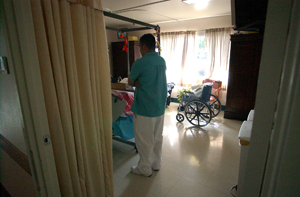
Residents of the Mabie Skilled Nursing facilities planned to represent many rural residents in need of care at a press conference Wednesday in support of a state assembly bill that aims to keep a planned deduction in the Medi-cal reimbursement rate for such facilities from going into effect.
“It wouldn’t cover our cost of daily care,” said Frankie Gallagher, the director of marketing for Hazel Hawkins Memorial Hospital in Hollister.
Gallagher said hospital CEO Ken Underwood, hospital board member Gordon Machado and some residents accompanied by family members planned to speak at a press conference Wednesday in support of AB 900, sponsored by state Assemblyman Luis Alejo.
“We are extremely concerned with the outcome of this and something needed to be done,” said Gallagher, a Free Lance editorial board member. “We needed someone in our corner. … We are thrilled we have someone who understands the needs of the community and the devastating impact it would have.”
At the two skilled nursing facilities associated with Hazel Hawkins Memorial Hospital, Mabie Northside and Mabie Southside, about 75 percent of patients in both facilities have Medi-cal insurance. The per-day rate for the facilities is $409 per patient, but the state approved a 10 percent rate reduction for reimbursement in 2011. The rate has not gone into effect because two agencies, including the California Hospital Association, have been challenging the reimbursement reduction in courts.
According to Jan Emerson-Shea, the vice president of external affairs for the California Hospital Association, the rates approved in 2011 were based on reimbursement rates from 2008-09 – which means the reduction could be close to 25 to 30 percent for some facilities.
Gallagher said in Hollister the Hazel Hawkins Memorial Hospital board would likely be forced to close one of the facilities, displacing an average of 50 residents. The clients who use the skilled nursing facilities are a mix of those with short-term and long-term medical needs. Gallagher said some of them stay for one to three months while recuperating from a surgery such as a hip replacement.
“But some are to the point in their lives where they can no longer live at home by themselves and they can’t have a home health aide,” Gallagher said. “Their family for one reason or another is not able to provide for the needs they have.”
Gallagher stressed that there are limited skilled nursing facilities in the region that accept Medi-cal insurance.
“They would have to go to the Central Valley or further down into Southern California,” Gallagher said, of local patients. “It would be devastating to an elderly patient who has lived here their whole lives to live so far away that they are not going to have that daily support they have from their families now.”
Alejo said he first became aware of the issue when Underwood told him about how the reductions would hit the local hospital. He said he also heard from officials at a similar facility in King City.
“If it (AB 900) does not go through many hospitals will have to shut down these centers,” Alejo said. “It will leave seniors and disabled people with nowhere to go.”
He said other facilities, many in rural counties, are facing the same issue.
The policy committee will review the bill in April with plans for it to move to the Assembly health committee for a policy discussion at the end of the month, but Alejo said the issue may be addressed during the state budget process when it starts in May.
“California is going to have a balanced budget in the next five years,” Alejo said. “It is projected to have a surplus. We can talk about some of these funds being restored for senior citizens and the disabled.”
Gallagher said at the very least, the Mabie facilities would need to lower the number of Medi-cal patients they admit to the skilled nursing home. She said they would likely lower the percentage of medi-cal patients to 40 percent instead of 75 percent of patients.
“We have to have a balanced payer mix to have a balanced budget,” Gallagher said. “When they are not reimbursing us even what it costs us – no business can sustain losses like that.”
If the reimbursement reduction is not reversed, it will be retroactive to June 2011.









